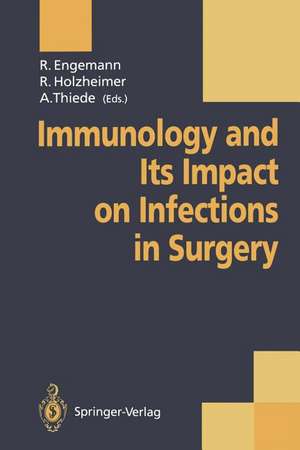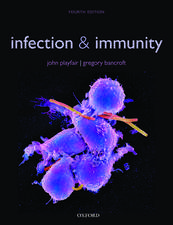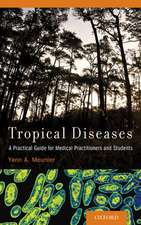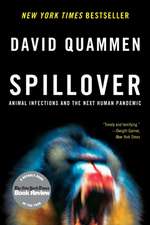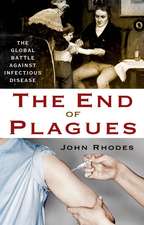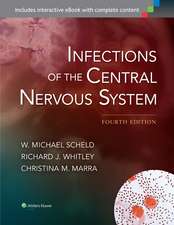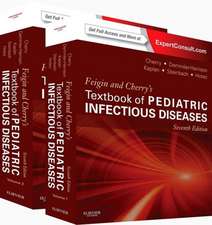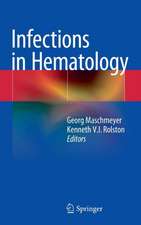Immunology and Its Impact on Infections in Surgery
Editat de Rainer Engemann, Rene Holzheimer, A. Thiedeen Limba Engleză Paperback – 22 noi 1994
Preț: 715.00 lei
Preț vechi: 752.63 lei
-5% Nou
Puncte Express: 1073
Preț estimativ în valută:
136.83€ • 142.33$ • 112.96£
136.83€ • 142.33$ • 112.96£
Carte tipărită la comandă
Livrare economică 14-28 aprilie
Preluare comenzi: 021 569.72.76
Specificații
ISBN-13: 9783540581451
ISBN-10: 3540581456
Pagini: 284
Ilustrații: XXVII, 253 p. 40 illus.
Dimensiuni: 155 x 235 x 15 mm
Greutate: 0.4 kg
Ediția:Softcover reprint of the original 1st ed. 1995
Editura: Springer Berlin, Heidelberg
Colecția Springer
Locul publicării:Berlin, Heidelberg, Germany
ISBN-10: 3540581456
Pagini: 284
Ilustrații: XXVII, 253 p. 40 illus.
Dimensiuni: 155 x 235 x 15 mm
Greutate: 0.4 kg
Ediția:Softcover reprint of the original 1st ed. 1995
Editura: Springer Berlin, Heidelberg
Colecția Springer
Locul publicării:Berlin, Heidelberg, Germany
Public țintă
ResearchDescriere
In this book, the recent developments in immunology and the impact on the treatment of infections in critical care and in surgery are presented, also describing how cellular immunology influences clinical treatment. This information helps in understanding the pathogenesis of infections in surgery and critical care. The impact of a standard treatment such as antibiotic therapy is evaluated and possible future therapy modalities outlined. This book will be of interest to clinicians and immunologists as scientists of both specialties have contributed to the book.
Cuprins
Animal Models.- Yersinia enterocolitica Infection in Mice: A Possible Experimental Model for the Immunobiology of Gram-Negative Infections.- Development of a New Animal Model for Chronic Abscess-Forming Peritonitis.- Tolerance to Endotoxin in an Animal Model of Acute Pancreatitis Is Associated with Improved Cellular Immune Function.- Prolonged and Recurrent Endotoxemia in Domestic Pigs: A First Step Toward a Porcine Model of Human Multiple Organ Failure?.- Endotoxin, Interferon-?, Biopterin, Serum Phospholipase A2 Activity, and ?-Endorphin as Differentiation Factors and Their Correlations in the Acute Immune Response During Lethal Gram-Negative Sepsis in LEW Rats.- Gene Expression.- The Effects of Burn Injury on Cytokine Production and Gene Expression.- Genomic Fingerprinting for the Evaluation of Epidemic Processes.- Interleukin-2 Receptor Expression Is Unaffected by Thermal Injury.- Keratinocytes Express an Intracellular Marker Gene and Regenerate the Epidermis in Porcine Full-Thickness Wounds After Retroviral Gene Transfer.- The Influence of Non-specific Inflammatory and Immunological Reactions on the Expression of Major Histocompatibility Complex and Activation Antigens After Murine Hepatic Transplantation.- Cellular Activation (1).- Cellular Endothelial Interaction and the Activation of Plasma Cascade Systems in Sepsis.- The Role of the Macrophage in Early Post-traumatic Immunosuppression.- Role and Measurement of Endotoxin in Septic Shock.- Normal Human Immune Peritoneal Cells: Predominance of Memory Lymphocytes.- Supplementation of Postoperative Enteral Nutrition with Arginine, RNA, and Omega-3 Fatty Acids Increases the Activity of Blood Monocytes in Cancer Patients.- Mild Surgery-Induced Changes in Human Peripheral Blood Lymphocytes.- Cell Activation (2).- Tissue Perfusion and Oxygenation Related to Wound Healing and Resistance to Infection.- Cell Cycle Progression and Signal Transduction in Normal and IgM Transgenic B Cells.- Pit Cells: Some Observations on Their Ultrastructure in Patients with Carcinoma and Viral Hepatitis Compared with Pit Cells in Rats Treated with Biological Reponse Modifiers.- Mediators.- The Polymorphonuclear Neutrophil: A Newly Recognized Participant in the Immune Response.- IL-6 Changes After Surgical Stress.- Does Epidural Analgesia During Labor Alter Postpartum Maternal IL-6 Serum Levels?.- The Effect of Epidural Analgesia During Labor on the Immune System. Part 2. Neonatal Blood IL-6 Levels.- Risk Factors.- Risk Factors for the Development of Surgical Infection.- Anergy and Postoperative Septic Complications.- The Relationship Between Platelet, Lymphocyte and Monocyte Counts, Sepsis and Survival in Polytrauma Patients.- CD4+ Lymphocytes as a Prognostic Indicator of Surgical Infection in the Immunodepressed Patient.- Immunologic Monitoring in Patients with Glioma Treated Neurosurgically.- Therapy Modalities (1).- High-Dose Immunoglobulins for Prophylaxis of Severe Sepsis.- Perioperative Immunity, Inflammatory Response, and Postoperative Infection in Cardiopulmonary Bypass Patients.- Therapy Modalities (2).- Immunological Consequences of Antibiotic Therapy.- Immunomodulation in the Critically Ill Surgical Patient.- Effect of Clindamycin in a New Standardized Animal Model for Chronic Abscess-Forming Peritonitis.- GM-CSF Modulates Immune Function and Improves Survival After Thermal Injury.- Early-Phase Endotoxin Tolerance Enhances Survival in a Porcine Endotoxin Shock Model.
